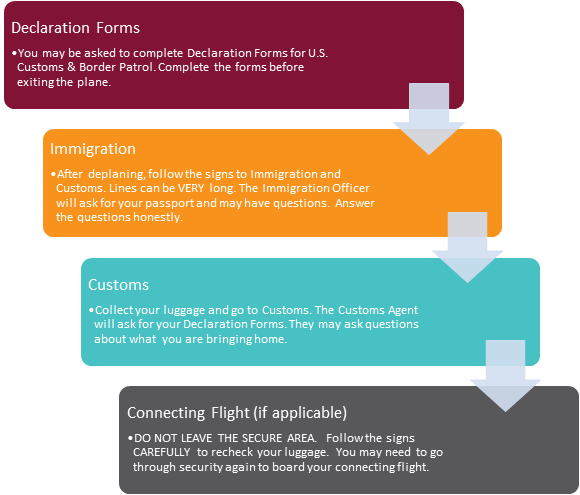Quick Links:
Integrating Your Experience on Campus
Global U Program
The Global U Program is designed to help students integrate their experience abroad into their lives at home, on campus, at work, and in the community. Through Career Development, Community Engagement, Language Immersion, and Research Experience, participants develop transferable skills that can be marketed to employers or highlighted on graduate school applications. Students can join the global U program any time. Students who complete the program receive a co-curricular transcript and are recognized at graduation.
Preparing to Return
Coming home can be stressful. Before your Program ends, think about the following details:
|
Category |
Checklist |
|
Financial |
|
|
Travel |
|
|
Academic |
|
|
Personal |
|
Re-entering the United States
The process for entering the U.S. will vary. In general, you should expect the following:

Wellness after Your Program
Learning abroad is an intense experience. You may experience physical and emotional symptoms after returning home. Common symptoms include:
- Exhaustion, fatigue, or sleeplessness
- Dehydration
- Discomfort with food or a change in appetite
- Environmental adjustments (air quality, humidity, etc.)
- Reverse Culture Shock
- Feeling isolated or disconnected from the new friends that you made
- Having trouble sharing your experience with others
- Frustration when friends and family don’t seem to be interested in your experience
- Financial Stress
- Boredom or disappointment
- Difficulty reconnecting with friends and family
While all of these symptoms are common, be sure to seek help if they persist. Learning Abroad is a great resource to help you navigate these issues. Our Global U Program Returnee Digital Seminar on YouTube has a series of videos to help students navigate re-entry. The following tips can help you process your experience and manage common re-entry symptoms:
|
Type of Symptom |
Tips |
|
Physical |
|
|
Emotional |
|
|
Social |
|
|
Professional & Academic |
|
Delays in Posting Grades
If you earned transfer credit on your program, there may be a delay in posting grades to your account. If you know that there will be a delay in posting your grades, contact the University Office of Scholarships and Financial Aid. If you intend to receive federal financial aid after your return from your program, the delay in posting your transfer credit could interfere with your ability to receive financial in the semester following your time abroad. To avoid this complication, communicate the situation to the University Office of Scholarships and Financial Aid so that alternative arrangements can be made.
Integrating Your Experience on Campus
After returning home, many students struggle to explain their experience to their peers, friends, and loved ones. This can be frustrating for recent learning abroad participants.
There are many ways to use your experience here on campus and in the community. Visit our Learning Abroad Alumni section for more details.
Handbook Contents
- Welcome/Content
- Orientation and Cultural Preparation
- Academic Policies and Procedures
- Student Conduct
- Travel Logistics
- Travel Health and Insurance
- Safety for Travelers
- Money Matters
- Diversity & Identity Abroad
- Coming Home
- Withdrawal & Dismissal Penalties and Procedures
- Information for Non-U of U Students
- Home
